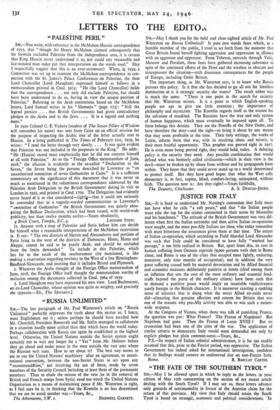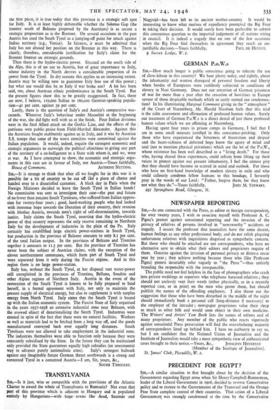"THE FATE OF THE 'SOUTHERN TYROL"
sm,—may I be allowed space in which to reply to the letters in your edition of May toth commenting on the section of my recent article dealing with the South Tyrol? If I may say so, these letters advance only grounds of sentimentality in favour of the Austrian claim for the return of this province. My view that Italy should retain the South Tyrol is based on strategic, economic and political considerations. In
me first place, it is true-today that this province is a strategic soft spot for Italy. It is at least highly debateable whether the Salorno Gap (the frontier south of Bolzano proposed by the Austrians) is as secure a strategic proposition as is the Brenner. On several occasions in the past Austria has used the South Tyrol as a jumping-off point for attack against Italian territory (e.g., Venice). In fairness, it must be admitted that Italy has not abused her position on the Brenner in this way. There is clearly, therefore, considerable justification for Italy's claim for the Brenner frontier on strategic grounds.
Then there is the hydro-electric power. Situated on the south side of ! the Alps, this is of no use to Austria, but of great importance to Italy, whose industry in the North derives a considerable proportion of its power from the TyroL In dry seasons this applies to an increasing extent. Austria may be willing now to guarantee Italy free use of this power ; but what use would this be,to Italy if war broke out? A lot has been said, too, about Austrian ethnic predominance in the South Tyrol. But the present figures show this to be greatly exaggerated. In fact, there are now, I believe, rio,000 Italian to 16o,000 German-speaking popula- tion-41 per cent. against 59 per cent.
Lastly, there is the question of Italy's and Austria's comparative war- records. Whatever Italy's behaviour under Mussolini at the beginning of the war, she did fight well with us at the finish. Four Italian divisions were in the final Allied attack on the Gothic Line, and the efforts of the partisans won public praise from Field-Marshal Alexander. Against this the Austrians fought stubbornly against us in Italy, and it NAts by Austrian S.S. troops that some of the worst atrocities were committed against the Italian population. It would, indeed, require the strongest economic and . strategic arguments to outweigh the political objections to giving any part of the territory of a co-belligerent to a State with whom it, and we, were at war. As I have attempted to show, the economic and strategic argu- ments in this case are in favour of Italy, not Austria.—Yours faithfully,



























 Previous page
Previous page